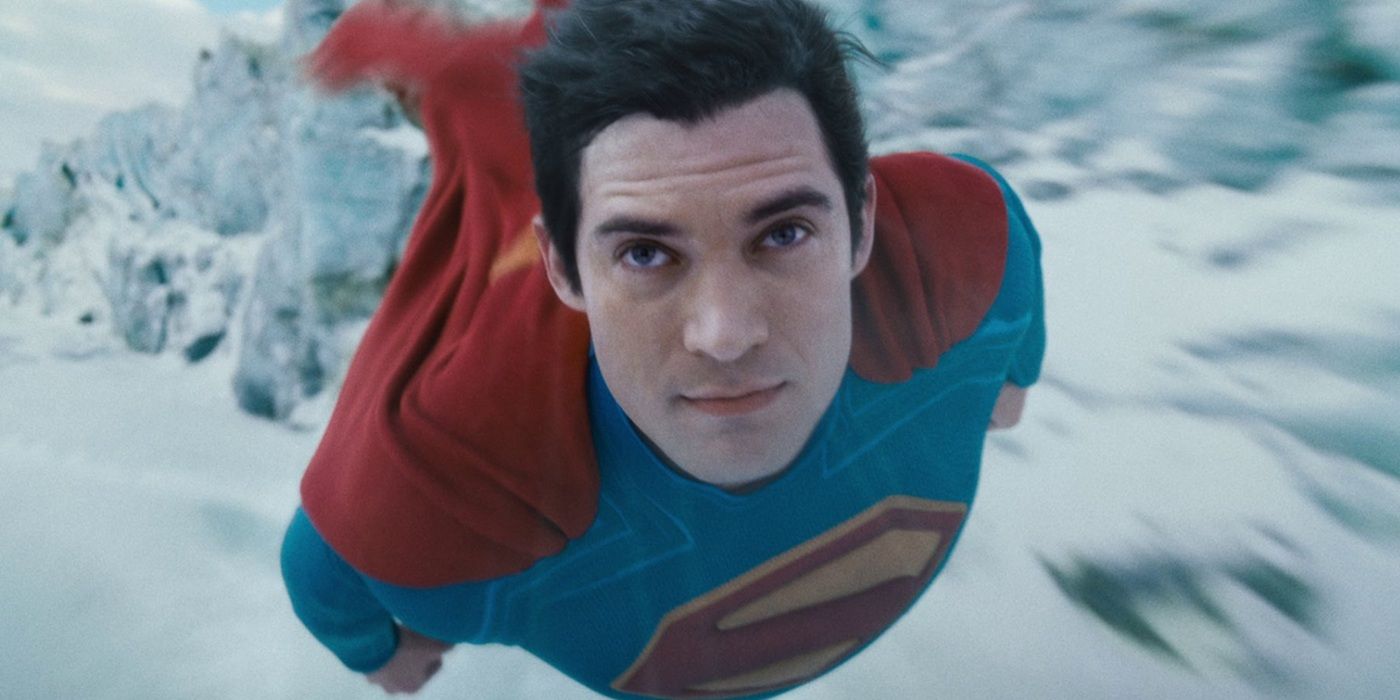Okay, we're being a little dramatic, but the later seasons of "The Walking Dead" got real messy real quick. As a refresher, we went through all 11 seasons and found which had rotted worse than a zombie on the beach, ranking them in terms of how little they matter to the story, how bizarre the narrative choices are, and how simply drop-dead boring they are to watch now.
The 10 Worst The Walking Dead Episodes, Ranked
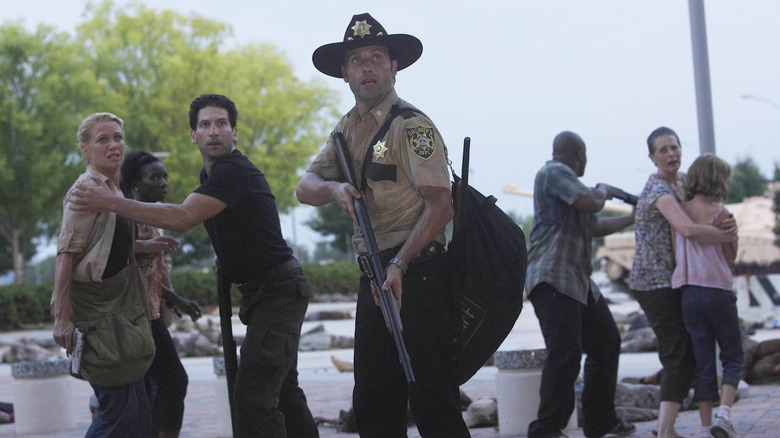
AMC
The first season of "The Walking Dead" is mostly excellent — by some standards, it might be an example of peak prestige television. Still, perhaps we should have been less surprised when later seasons began packing in the filler, when the series struggled to maintain momentum in its more than manageable six-episode debut outing. Even if you want to call "The Walking Dead" season 1 "peak TV," you have to acknowledge the startling valley that is "Wildfire."
Some fans may immediately disagree with this pick. At the time of its airing, when the show was still fresh, it was a forgivable or perhaps even welcome change in pace. If you haven't seen it since your first watch-through of the series, you likely don't have strong memories about this episode specifically, good or bad. But revisiting after so many seasons of deadly wheel-spinning, it's hard not to recognize the early signs of the show's decay in "Wildfire" and not be a little annoyed they let the problem spread like ... well, you know.
The episode picks up right after "Vatos," which is almost its polar opposite, highlighting the human conflict and constant sense of danger that would mark the show's most classic moments. In the aftermath, "Wildfire" is a walking story about the group making their way toward the CDC, where they hope to learn the origins of the zombie virus. It's a depressing, hour-long teaser for the first season finale that defines all the hallmarks of a bad episode of "The Walking Dead."
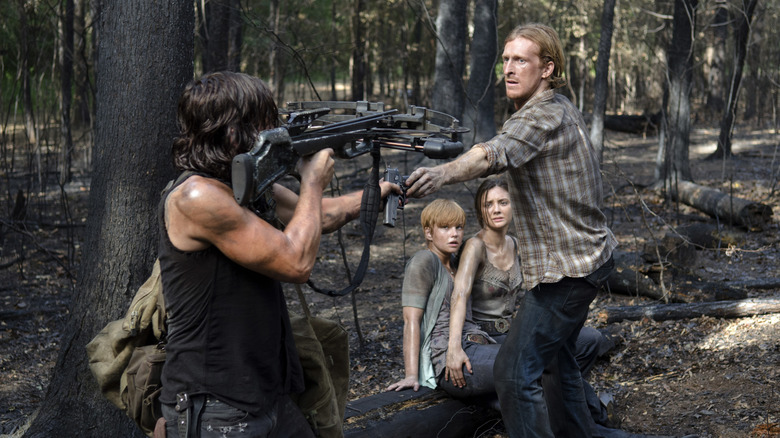
AMC
A generous and not entirely inaccurate assessment of "Always Accountable" is that it's subtle in its necessity to the overarching story of "The Walking Dead." Upon first watching the episode, you might not realize you and the survivors are stumbling right into one of the last great arcs of the series overall — though that's also a reason why we don't like it as an episode very much.
Essentially all of the main series cast is absent for the season 6 episode, which follows the aftermath of a mission gone wrong undertaken by Daryl (Norman Reedus), Abraham (Michael Cudlitz), and Sasha (Sonequa Martin-Green). When they're forced to split up to flee the then-unknown human soldiers who try to ambush them, Daryl winds up running into Dwight (Austin Amelio) for the first time. Of course, as fans would soon come to learn, Dwight was himself on the run from the Saviors, the cult-like group of psychopaths led by Jeffrey Dean Morgan's Negan.
That aside, "Always Accountable" doesn't have anything of substance to offer in terms of meaningful conflict. The old reliable "Should I really trust this stranger?" is the only thing close to a narrative backbone this story has, and boy, does that bone crack when Dwight winds up betraying Daryl anyway. As for Abraham and Sasha's story, they're left to stall and pad the runtime to make for a logical enough reunion by the episode's end.

AMC
In a vacuum, "Stradivarius" isn't necessarily a bad or poorly-told story, nor an unwatchable episode of television — in fact, coming to it on its own as a short film of sorts might be a way one could even call it a great piece of storytelling — props to writer Vivian Tse and Abraham actor Michael Cudlitz, who made his directorial debut with this episode.
But in the context of "The Walking Dead" — its dwindling and increasingly meandering overarching narratives, and depressing lack of momentum nine seasons in — the episode is a frustratingly complacent entry in the series. It signaled that the show would refuse to end gracefully and that its quality would continue to steadily decline as it trudged forward. In other words, "Stradivarius" is the moment "The Walking Dead" crossed the threshold and committed to becoming a full-time zombie show ... in a bad way.
For video game fans, the plot runs like two parallel escort missions. Carol (Melissa McBride) and her adopted son Henry (Matt Lintz) venture into the wilderness with Daryl, where some run-of-the-mill forest zombie stuff happens while Michonne (Danai Gurira) leads a small group of Alexandria survivors to their post-apocalyptic utopia at the Hilltop Colony. With so many new character introductions and revelations about older characters, "Stradivarius" should hit way harder — except we don't really have a reason to invest in these newcomers, nor do we have any energy left to force interest in whatever untold trauma is about to be unearthed by the old ones. It's an hour of television that is weirdly made worse the more you remember about the show leading up to it.
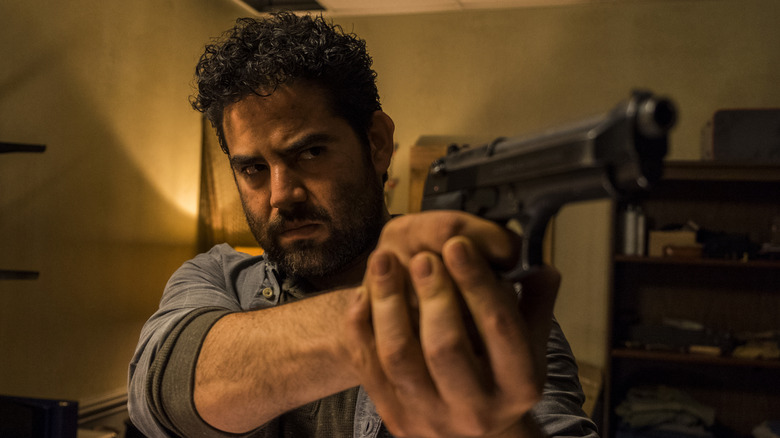
AMC
If "Stradivarius" brings about the zombification of "The Walking Dead," then "Monsters" — which aired a season earlier — sees the show in the final stages of brain death. This isn't to say the writing, directing, or anything else suddenly becomes "dumb" logically, but that the collective memory of the series at large has seriously deteriorated. This is evident in the episode's fairly didactic exploration of morality in the post-apocalypse, a bedrock idea for "The Walking Dead" that was already beaten to bits by the fifth season. And yet, perhaps because the show had already lived far past its expiration date, it chose to dig deep into the ground, re-discover the nuggets they'd already shown off to viewers, and try to tout them as something new and profound.
At no point is this performance of thoughtfulness more insulting than in the conflict between Andrew Lincoln's sheriff-gone-bad Rick Grimes and Morales (a member of Negan's bloodthirsty cult of killers called the Saviors, played by Juan Pareja). Every piece of tropey dialogue you could think of is used to trick the audience into thinking that Rick actually has something to wrestle with here, either regarding the lives he's taken to survive the apocalypse or the death of the deranged murderer holding him at gunpoint. This is the same Rick Grimes who was shooting first and asking questions never as early as season 2. (Remember "Nebraska?" The show sure doesn't!)
One could make the argument that Rick's arc throughout the series is about losing his humanity to the apocalypse early on, then being forced to redefine his values every time he's asked to be a leader. But the show just doesn't sell that thematic justification as anything more than nice-looking sand that can't support the aspirations of an episode like "Monsters."
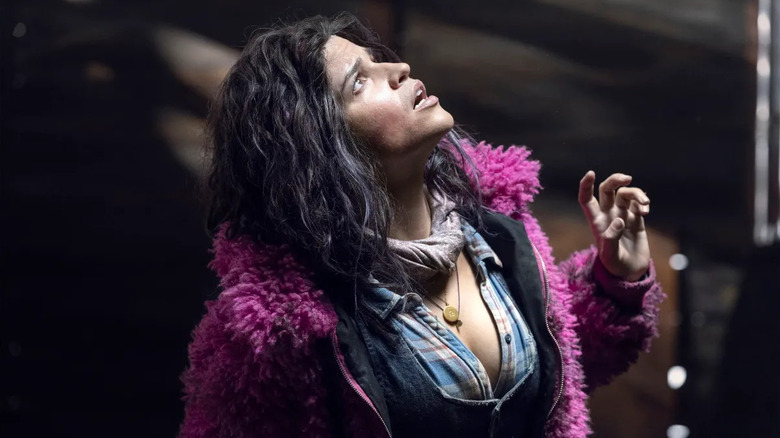
AMC
In the aftermath of the COVID-19 pandemic and the subsequent safety measures enforced on public gatherings, film and television crews had to adjust the way they told stories for the immediate future. But for "The Walking Dead," this also meant figuring out a way to fill six extra hours of television added onto season 10, all of which aired significantly later than the season proper. Some call these the "bonus" or, derisively, the "COVID" episodes, and unfortunately, either name is pretty fitting when referring to the episode "Splinter."
It begins with a group of survivors, including Paola Lázaro's Juanita "Princess" Sanchez, being captured by Commonwealth soldiers, after which they are imprisoned separately as they await interrogation. During this period of isolation, Princess basically spends the episode talking to herself and having revelations about how her traumatic upbringing shaped the way she treats people in the present. It's certainly sad and explanatory, but the story struggles to hold the audience because it ultimately doesn't matter to the overarching narrative unless you're hyper-focused on Princess' arc. It is the most "bonus" of the bonus episodes, in the worst ways possible, though, as we'll discuss further down, it's certainly not the worst bonus episode overall.
In terms of the COVID-ness of it all, the fact that the actors are unable to interact with each other as they normally would is not the fault of the series — but that doesn't mean it's not distracting in basically every scene.
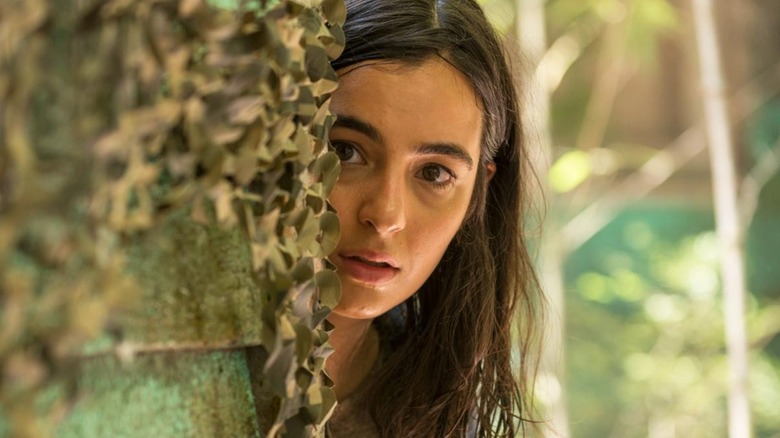
AMC
A lot of episodes of "The Walking Dead" disappoint because they don't move the story forward — but we'd normally take that over an episode that essentially drags the story backward like "Swear." As is the case for one of our top contenders for the worst "Walking Dead" episode of all time, "Swear" is a standalone episode that functions as an extended "Previously on..." segment for a character the writers had to have disappear for a while. Here, it's Tara, a former soldier in the Governor's (David Morrissey) army, introduced in season 4 and played by Alanna Masterson. By season 6, Masterson was part of the central "TWD" cast, until Tara left for a supply run toward the end of the season with Corey Hawkins' Heath.
"Swear" attempts to explain what happened to these two characters during the several intervening episodes (which included a season break between 6 and 7) and justify why they haven't returned (and, in the case of Heath, will never return), while also tying things into the overarching story – sike. On that last point, "Swear" is yet another totally skippable episode in the grand scheme of things, the only things of note being Tara's eventual return to Alexandria (the consequences of which aren't even focused on here) and her discovery of the Oceanside community. Otherwise, the misadventures of Tara and Heath are just that — adventures you can miss.
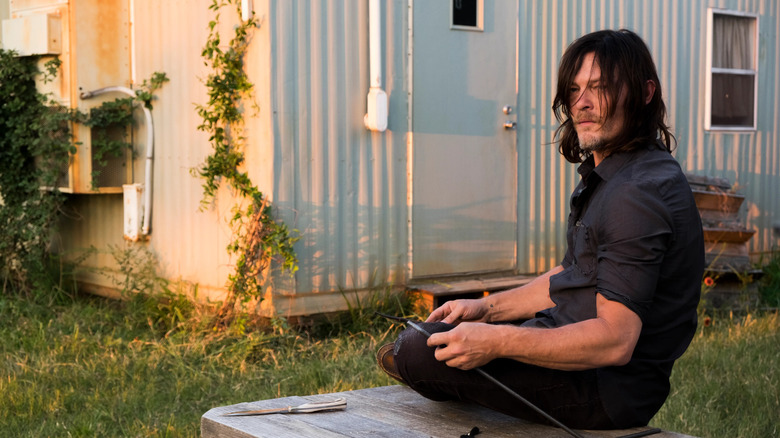
AMC
At first, "The Other Side" seems like it could be one of the more solid episodes of the notably uneven seventh season of "The Walking Dead." The meat of the episode gets cooking when the Saviors ambush the Hilltop community, forcing everyone present to engage in frantic, tactical warfare against an enemy who is stronger and better prepared than they are — not to mention, it also seemingly serves to kickstart the grand finale of Negan's seasonal arc. All good, right? Oh, wait — there are two episodes after this one in the season.
See, "The Walking Dead" has a consistent pacing quirk. Toward the end of a given season (especially the later ones), the writers seem to have everything they want to go down in the last two episodes all planned out, stuffing all the climactic action into what essentially amounts to a two-part finale. That's all very well, except that usually means the third-to-last episode is where everyone has to scramble (often in convoluted or manufactured ways) to get to their places for the final showdown.
In "The Other Side," this leads to storylines like Sasha's, where she's pushed toward a predetermined endpoint not by dramatic action or character development, but by the invisible hand of the script that knows she's being set up for a two-episode imprisonment-betrayal-sacrificial-assassination arc. It's serviceable storytelling in the most literal sense, which is always a bummer to watch.

AMC
When you see the title "The King, the Widow, and Rick," what images does it inspire? A good old-fashioned western-tinged adventure about three of the most charged characters on "The Walking Dead?" A play on an Arthurian legend that blends this post-apocalyptic with the strange, neo-medieval code it introduced? An homage to "The Good, the Bad, and the Ugly?" Unfortunately, any of those options would be projecting more meaning onto the show than it even cared to pretend at in this episode — the title is just a blunt, almost placeholder-like statement about which three grumps we're trailing behind this week.
There is nothing thematic or cohesive about "The King, the Widow, and Rick." It is literally just an episode that shifts between the perspectives of "King" Ezekiel (Khary Payton), "Widow" Maggie (Lauren Cohan), and Rick, and only Rick is really doing anything that furthers the plot. The three-way alliance between the Kingdom, the Hilltop, and Alexandria has gotten them all to a place that feels like a step away from victory against the Saviors. So, naturally, "The Walking Dead" stays in that step as long as it can by having Ezekiel sulk about how bad of a king he is-slash-was (and take no new actions), make Maggie wrestle for the entire hour about whether or not to feed their prisoners (and take no new actions), and send Rick on fetch quest with the Scavengers (which teases some new actions the following week on "The Walking Dead").
Meanwhile, the other six storylines jammed in here are equally pointless — particularly Michonne's, as she risks her life to go spy on the Sanctuary (for reasons), nearly gets killed, but then gets saved at the last minute, even foiling the Saviors' briefly interesting countermeasure to the walker siege. It's a boring episode with no action — dramatic or otherwise — and almost no consequences for the rest of the season.
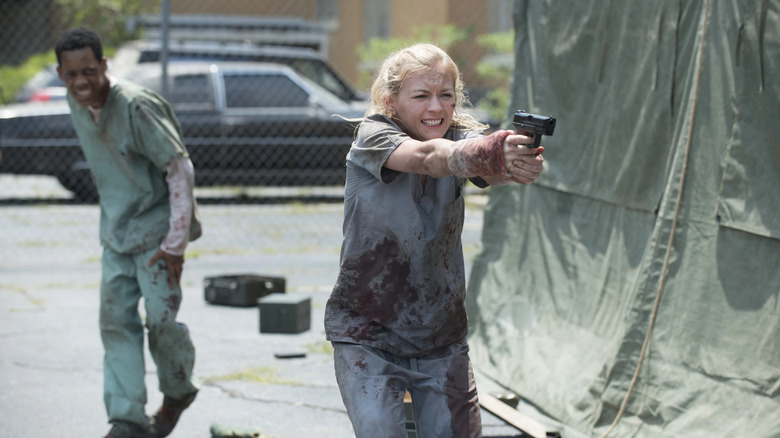
AMC
We've noted numerous times throughout this piece that "The Walking Dead" should have ended much earlier than it did — and if we had to pick a season where it could have been laid to rest with the dignity its earliest efforts deserved, we'd say "The Walking Dead" should have ended with season 5. This is for a variety of reasons, good and bad, but (most important for our purposes) season 5 is where the world starts to get a little too big, and the stories start to get a little too comfortable isolating themselves someplace where they can kill an hour without moving the story forward much at all. Case in point: "Slabtown."
Beth Greene (Emily Kinney) — the daughter of farm vet Hershel Greene (Scott Wilson) and sister to Maggie — is not a character who exists in the original comic book series, a fact which (especially earlier in the show's run) made her unique and somewhat more unpredictable than the majority of the cast. By "Slabtown," however, it became clear that this had become something of a hindrance to the show, as they couldn't figure out what exactly to do with her even as the story diverged dramatically from Robert Kirkman's source material. Thus, the writers did what "The Walking Dead" does in its weakest moments — wasting just enough time trying to convince you she's emotionally important so that they can use her as a cheap death.
That's what "Slabtown" is. After conveniently making her disappear in season 4, this episode shows us where she's been — unfortunately, the answer is that she's just being forced to work in an Atlanta hospital with/for a bunch of other new characters the story doesn't care about. To add insult to injury, she vanishes again at the end of this episode until the writers want to kill her off in the mid-season finale.
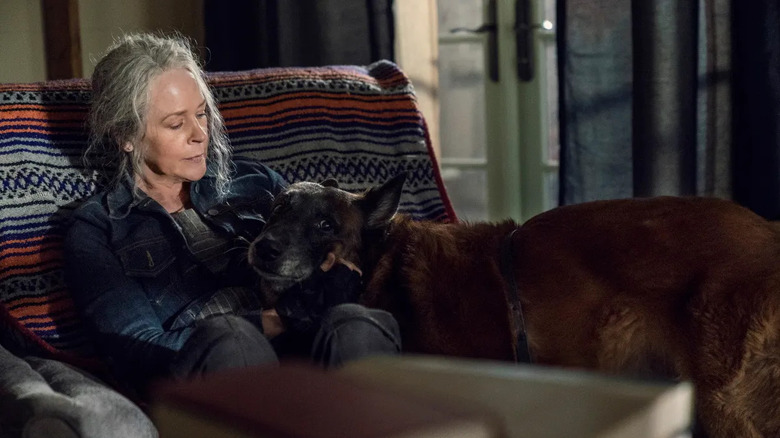
AMC
We tried, dear reader. We tried. Picking one of the inherently unnecessary season 10 "bonus" episodes for the No. 1 spot seemed like low-hanging fruit — not to mention one that has been so unanimously dismissed by critics and fans alike that it is unquestionably considered the worst episode "The Walking Dead" has ever put out. We tried to find a more surprising pick; we tried to find episodes that were somehow worse than people remember. But then, reader, we tried watching "Diverged." And that proved most trying of all.
It's a huge, relentless, indulgent bummer. It focuses on Carol and Daryl, two characters who are more than happy to be alone. The oversight here, however, is that loner characters still need someone to interact with in order to grow, especially when their most compelling conflict is with another major character on the show. Admittedly, due to circumstances beyond the show's control, Carol and Daryl couldn't really interact to solve the rift in their relationship — but that doesn't mean the best use of an hour of television is to send them each off to a corner to mope unproductively on their own.
Carol's portion of the episode is certainly trying at ... something. Her deep need to make soup in the face of a rat infestation feels inspired by the most relatable but depressing parts of COVID-era isolations and a half-rewatch of the "Breaking Bad" episode 'The Fly.'" There is something human there, but gosh darn it, that just isn't enough after 10 seasons of storytelling.
We tried not to choose so many episodes from the later seasons. But ultimately, our autopsy of this show is that it was dead long before it died. Episodes like "Diverged," no matter how admirable their attempts at ingenuity or humanity are, still don't give their story, their characters, or most importantly, the audience, a reason to feel alive.










